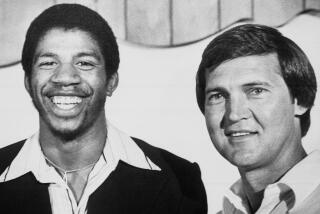Column: LZ Granderson: Hard to ‘stick to sports’ when sports doesn’t stick to sports
- Share via
Picture this: Winter in Detroit. The year — 1988. Guns N’ Roses were new, Jheri curls were old and my beloved Detroit Pistons had just lost to the Los Angeles Lakers … again. At this point the Pistons were 4-13 against Magic Johnson, the local legend who was stolen from us by Dr. Jerry Buss.
The next month we lost again, making it 4-14. A few months later we lost to them in heartbreaking fashion in the NBA Finals. You would think all of this butt kicking would cause me to hate the Lakers, but you’d be wrong. I always loved the Lakers because I always loved Magic, the local legend who inspired so many, including myself, to reach for higher heights.
When I hear the phrase “stick to sports” I usually roll my eyes and snicker. Not because I have this burning desire to talk about racist hiring practices or the hypocrisy of the NCAA but because I’m not afraid to recognize the truth: Sports doesn’t stick to sports.
Its cultural and financial impact on our society are far too great to pretend all that matters is the box score. No one told the media to stick to sports when we covered how the New Orleans Saints helped the city heal after Hurricane Katrina. No one says stick to sports when we cover a team’s visit to a children’s hospital or when cameras were on hand the moment Nike made Justin Gallegos the first athlete with cerebral palsy to have a pro contract.
We don’t shun those types of stories because they remind us how wonderful humans can be when we show compassion toward one another. Stories like those generally make us feel good, and sports is oftentimes a fantastic conduit for this level of storytelling because it inherently brings people from varying backgrounds together.
The reality is “stick to sports” isn’t a demand for more highlights and scores, it’s a euphemism for: “This conversation is making me uncomfortable.” For just as sports can highlight the good in society, it can showcase our shortcomings as well. Some would rather blame the media for revealing these shortcomings than think about them.
For example, right now there are brave members of the military who happen to be gay defending this country in war zones, yet we’re told those same men would be too much of a distraction for an NFL team to be successful. It’s irrational and I don’t mind occasionally pointing that out because sports has repeatedly shown it is big enough to handle it.
Picture this: Winter in Detroit. The year — 1989. A former Laker girl wants us to be “Straight Up,” Arsenio Hall is breaking it down and my beloved Pistons had just beaten the Lakers … again. It’s just a two-game winning streak in the series but but we’ll take it. A few months later we sweep them in the NBA Finals. You would think after so much suffering I would be happy to stomp on the Lakers’ grave, but you’d be wrong.
I always loved the Lakers because I always loved Magic. He pulled his hamstring in Game 2 and I was afraid the local legend was nearing the end of his career. Thirty years later so many athletes continue to inspire so many to reach for higher heights because they understand that the box score is only a part of sports. It was never the whole story.
Editor’s note: LZ Granderson will write a weekly a column for the Los Angeles Times.
More to Read
Go beyond the scoreboard
Get the latest on L.A.'s teams in the daily Sports Report newsletter.
You may occasionally receive promotional content from the Los Angeles Times.










